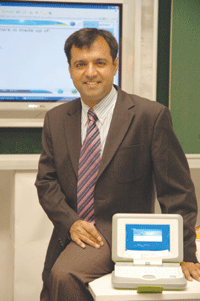Dilip Thakore interviewed Shantanu Prakash, the chairman and chief executive of Educomp Solutions Ltd (ESL), in the company’s six-storied headquarters in Gurgaon, on the outskirts of Delhi. Excerpts:
 Rather unusually for an education products and services corporate, Educomp has emerged as a fancied blue-chip company of investors in the stock exchanges. What’s your explanation of this phenomenon?
Rather unusually for an education products and services corporate, Educomp has emerged as a fancied blue-chip company of investors in the stock exchanges. What’s your explanation of this phenomenon?
We were the first company to believe in giving the public the opportunity to invest in education — something they know makes for a good business model. Therefore right from the start, our approach has been to apply the principles of business and industry management to delivering high quality, reasonably priced education, which people are ready and willing to pay for. We were the first education company to go public which necessitated making our business and operations transparent. Our straightforward and transparent way of working clearly demonstrated to the investing public that Educomp’s revenue and business model works and that a growing number of schools, parents, teachers and students are ready to subscribe to it.
Hence the approval of the company by the investor and general public. We believe that we sparked off a trend and put the education business in India on the global centrestage. The world over, education stocks are among the most fancied because of the resilent characteristics of this industry which is non-cyclical, recession proof, price inelastic and so on.
What are the distinguishing features of the Educomp business model?
India has the world’s largest child and youth population which is under-served in terms of the penetration of education services. It also faces severe challenges in fulfillment and quality, for example the school drop out rate in the country is over 40 percent! Therefore we felt there was an opportunity to make interventions in the classroom to improve teacher productivity and student performance. We chose to use technology to create path-defining products so that they would be scaleable and their effectiveness would be measurable.
We see several challenges in India: on one hand there’s the need to improve student academic performance, on the other, we see the need to provide access to education for over 100 million children who are currently out of school. Further we need to bring about a qualitative change in the pedagogical approach, away from rote learning to focus on problem solving skills, creative thinking and innovation. Our vision is to be the leading provider of solutions that improve student learning outcomes.
The solutions that we offer have scalability and unique competitive advantage based on research and tangible intellectual property. Educomp’s solutions such as SmartClass, Mathguru, online tutoring, K-12 initiatives and instructional and computing technologies (ICT), all broadly fall in this category. We have developed all our products to solve specific problems in the education supply chain.
The major challenges of Indian education are in public sector schools and colleges. How involved is ESL with government-funded and managed education institutions?
We are very involved with government institutions, particularly schools. Currently we provide our ICT services to over 7,300 government schools in 13 states in public-private partnerships with state governments. As such we have the largest number of education PPP agreements of any company in India and 30 percent of our revenue is derived from the education ministries of Central and state governments. I believe that the PPP model in education has very bright prospects and this year we expect to double the number of government schools to whom ESL provides ICT services.
Currently only 35,000 government schools countrywide are IT-enabled and there is growing awareness within government and the public that government schools should not remain second class. The Union government has been very enlightened in its approach to solving the large education problems of India. Specially noteworthy is the imposition of the education cess which has created a permanent and much needed funding structure for improvement of Indian education.
The market buzz is that esl is all set to export its education model and learning systems abroad. Please comment.
Yes. we believe we have developed school education products and learning systems which have huge application in foreign markets as well. We have had a significant presence in the US for over four years which has dramatically improved with our acquisition of a majority stake in Learning.com. ESL has acquired companies in the US and Singapore — Learning.com and Ask ‘n’ Learn — which are already connected with schools in those countries as education services providers.
Moreover we have recently signed a joint venture with the Raffles Education Corp, Singapore, under which we propose to introduce their professional education syllabuses in India and take their help to market ESL products and services in the People’s Republic of China.